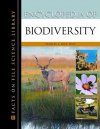![Encyclopedia of Biodiversity Encyclopedia of Biodiversity]()
Click to have a closer look
About this book
Customer reviews
Biography
Related titles
About this book
The United Nations Convention on Biological Diversity defines biodiversity as "the variability among living organisms from all sources, including terrestrial, marine, and other aquatic ecosystems, and the ecological complexes of which they are part," including diversity within and between species and of ecosystems. As a result of advances in technology and research and through legislation, the scope of the science continues to expand. The Encyclopedia of Biodiversity is a comprehensive full-color resource that illustrates the contributions to the worldwide environment of "healthy" species and the ecological communities in which they live and the importance of preventing existing species from extinction.
The encyclopedia features more than 150 cross-referenced entries – most concluding with sources for further reading – that detail a subject's significance and its relation to biodiversity. Encyclopedia of Biodiversity includes five essays, interspersed throughout the text, that discuss the prodigious number of species worldwide, the coevolution of species, the economic benefits from ecosystem services, and other topical issues.
The encyclopedia also includes a breakdown of the entries by National Science Education Content Standards, grades 9 through 12, and four helpful appendixes – a chronology, a glossary, a bibliography of print and Web resources, and a chart that outlines the myriad characteristics of different groups of organisms – as well as an extensive index. The Encyclopedia of Biodiversity is an indispensable publication that will meet the specific demands of students, laypersons, and working professionals with an interest in this interdisciplinary field.
Customer Reviews
Biography
Stanley A. Rice, Ph.D., is a professor of biology in the Department of Biological Sciences, Southeastern Oklahoma State University, Durant. His current research, with undergraduate coinvestigators, involves evolutionary ecology, for example, anti-herbivore defenses in plants and evolutionary patterns in the opening of tree buds in spring. He has published articles in peer-reviewed journals such as American Journal of Botany and American Biology Teacher and has made numerous presentations to scientific societies, such as the Botanical Society of America (for which he has chaired two symposia), the Ecological Society of America, and the National Association of Biology Teachers. He is also the author of Facts On File's acclaimed Encyclopedia of Evolution ("Honor Book, 2007,"Science, Grades 7-12--Society of School Librarians International) and Green Planet: How Plants Keep the Earth Alive (published by Rutgers University Press; one of Choice's "Outstanding" books for 2009).

























